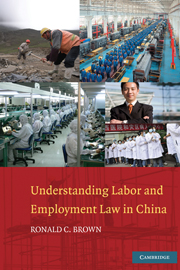Book contents
- Frontmatter
- Contents
- Preface
- Acknowledgments
- Understanding Labor and Employment Law in China
- PART I UNDERSTANDING CHINA'S REGULATION OF THE WORKPLACE
- PART II EMPLOYMENT RELATIONSHIPS
- PART III HIRING AND EMPLOYMENT PRACTICES
- PART IV WORKING CONDITIONS, WAGES, AND HOURS
- PART V EMPLOYEE BENEFITS: LEAVES, MEDICAL, MATERNITY, WORK-RELATED, UNEMPLOYMENT, AND PENSION INSURANCE
- PART VI DISCIPLINE AND TERMINATION UNDER EMPLOYMENT AGREEMENTS
- 12 Employer Work Rules, Discipline, and Termination
- 13 Restrictive Covenants: Employee Loyalty and the Employer's Protectable Interests
- 14 Resolving Labor Disputes by Mediation, Arbitration, and Litigation
- PART VII RIGHTS, REMEDIES, AND MULTIPLE FORUMS
- Appendix
- Index
- References
12 - Employer Work Rules, Discipline, and Termination
Published online by Cambridge University Press: 22 January 2010
- Frontmatter
- Contents
- Preface
- Acknowledgments
- Understanding Labor and Employment Law in China
- PART I UNDERSTANDING CHINA'S REGULATION OF THE WORKPLACE
- PART II EMPLOYMENT RELATIONSHIPS
- PART III HIRING AND EMPLOYMENT PRACTICES
- PART IV WORKING CONDITIONS, WAGES, AND HOURS
- PART V EMPLOYEE BENEFITS: LEAVES, MEDICAL, MATERNITY, WORK-RELATED, UNEMPLOYMENT, AND PENSION INSURANCE
- PART VI DISCIPLINE AND TERMINATION UNDER EMPLOYMENT AGREEMENTS
- 12 Employer Work Rules, Discipline, and Termination
- 13 Restrictive Covenants: Employee Loyalty and the Employer's Protectable Interests
- 14 Resolving Labor Disputes by Mediation, Arbitration, and Litigation
- PART VII RIGHTS, REMEDIES, AND MULTIPLE FORUMS
- Appendix
- Index
- References
Summary
Employer Work Rules and Discipline
The Labor Law and Labor Contract Law require employers to establish labor rules and regulations to ensure that workers enjoy their rights and perform their labor obligations; the LCL further requires the employer to have certain “consultations” with employees about those rules. Under the LCL, the employer first has a duty of “discussion” with the worker's Congress or all of the employees when it “formulates, revises or decides on rules and regulations or material matters that have a direct bearing on the immediate interests of its workers.” These topics include “labor compensation, work hours, rest, leave, work safety and hygiene, insurance benefits, employee training, work discipline, or work quota management.” The Congress or employee group shall put forward a “proposal and comments,” whereupon the matter shall be determined by “consultations” between the employer and the labor union or the employee representatives. If there is disagreement on the rules' appropriateness, the employer is to seek to improve the rules by amendments. Interestingly, the law does not explicitly require consent before the rules are implemented. Handbook rules and regulations on the above topics that are in conflict with the law are invalid.
Employers' work rules on conduct typically lay out conduct standards with consequences for violations, including warnings, suspensions, terminations, loss of pay, and demotions. They also provide a basis for employers and arbitrators in evaluating the performance of employees, and they offer justifications for personnel decisions other than discipline, such as granting leaves and bonuses.
- Type
- Chapter
- Information
- Understanding Labor and Employment Law in China , pp. 151 - 162Publisher: Cambridge University PressPrint publication year: 2009

